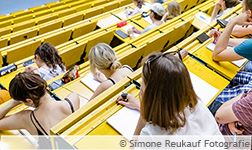Hauptinhalt
Topinformationen
Pressemeldung
Nr. 60 / 2023
20. Juli 2023 : Humanity and solidarity in action - University now a member of the Scholars at Risk network
Osnabrück University has always provided practical support and assistance to international scientists, scholars and students who need to work and study in environments harmful to their academic or their personal pursuits. Since the start of the Russian invasion of Ukraine in February 2022 Osnabrück University has stepped up its efforts to help out such academics. Now, the University has joined the international Scholars at Risk (SAR) network.
Scholars at Risk, a U.S.-based international network of academic institutions, has joined forces to support threatened scholars and defend academic freedom. "Our participation in the network is emblematic of our humanitarian responsibility. We stand in solidarity with researchers and students threatened by war and persecution and strive to provide them with comprehensive support," says the University's Vice President for International Affairs, Diversity and Academic Staff Development, Prof. Dr. Andrea Lenschow.
In recent years, the University has taken numerous measures to help academics and students affected by displacement and persecution. Some of the University's successful commitments include the acquisition of a Hilde-Domin-Program scholarship from the German Academic Exchange Service (DAAD) and the hosting of a Research Fellow through the Phillip Schwartz Initiative (PSI) in 2020, which also allowed for the reunification of their family in Osnabrück. The continued support of the Research Fellow was made possible by the generous financial support of the University Society Osnabrück, a non-profit association of friends, supporters and alumni of Osnabrück University. Two additional highly competitive PSI grants have since been approved and more are in the process of application. In direct response to the Russian attack on Ukraine, the University was also able to offer a professional future to nine female academics from Ukraine: Two employment contracts were issued and seven individuals received Volkswagen Foundation scholarships. In close cooperation with committed professors at the University, the Ukrainian scholarship holders were thus able to continue their research here. Applications for a 12-month extension of these scholarships were recently approved by the Lower Saxony Ministry of Science and Culture (MWK) and the Volkswagen Foundation.
The crisis in Ukraine has also affected a number of students in the University’s regular degree programs as well as some exchange students spending their semester abroad in Osnabrück. In order to help these students in need, the University has set up a Future Fund, through which, so far, 15 scholarships amounting to €22,500 in total have been paid out, especially to students from Ukraine. The University aims to continue this form of support for students and scientists in the future. In addition, the University secured further funding by the DAAD totaling €22,800 to support students in need. The University’s broad support program also includes various counseling and wellbeing services for students from Russia, Belarus, and Ukraine as well as peer-support by student volunteers backed by the DAAD Welcome Program.
"As an institution with partners all around the world, we must be able to react quickly to global developments. Particularly in the face of the multiple crises we face today, strategic foresight and resilient networks are crucial. Against this background of polycrisis, it is all the more significant that the University has joined Scholars at Risk network," says Malte Paolo Benjamins, Head of the International Office.
"We are aware that our efforts can only alleviate each individual’s immense suffering, but we feel all the more obligated to counteract the horrific effects of war and persecution through very concrete forms of aid," said Prof. Lenschow. "On behalf of the President’s Cabinet, I would like to thank the colleagues in our academic departments and administrative units, as well as the University Society Osnabrück, who have all contributed to raising the funds necessary to establish these successful support programs."
Further information for editorial offices:
Malte Benjamins, Universität Osnabrück
International Office
Neuer Graben 29, 49074 Osnabrück
E-Mail: malte.benjamins@uos.de





